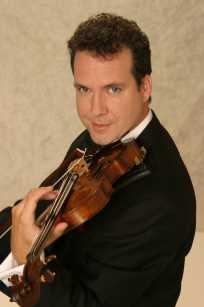The role of the Concertmaster
 Violinist Scott Flavin is concertmaster of the Florida Classical Orchestra, the orchestra for Florida Grand Opera and Miami City Ballet, as well as the Florida Sunshine Pops. He is also a member of the internationally-acclaimed Bergonzi String Quartet, quartet-in-residence at the University of Miami, where he is professor of violin. From 1988 to 1993 he was a member of the Rochester Philharmonic Orchestra. His recordings include chamber music on the Centaur and Naxos labels, as well as commercial recordings with Miami Symphonic Services.
Violinist Scott Flavin is concertmaster of the Florida Classical Orchestra, the orchestra for Florida Grand Opera and Miami City Ballet, as well as the Florida Sunshine Pops. He is also a member of the internationally-acclaimed Bergonzi String Quartet, quartet-in-residence at the University of Miami, where he is professor of violin. From 1988 to 1993 he was a member of the Rochester Philharmonic Orchestra. His recordings include chamber music on the Centaur and Naxos labels, as well as commercial recordings with Miami Symphonic Services.
What is a concertmaster?
Well, the term concertmaster always strikes me as so pompous...the "master" of the concert.... Historically, the concertmaster, or "first violinist" would lead or conduct the whole orchestra ( in the days before conductors). Today, a concertmaster can be expected to conduct in the absence of the conductor and assistant conductor; this happens very rarely, if at all, as most conductors hardly ever relinquish control!What does a concertmaster do?
Basically, the concertmaster has several duties: first, the concertmaster makes a solo entrance to greet the public on behalf of the orchestra, then supervises tuning (of course, the oboe really does all the work).As the principal violin player of the violin section, the concertmaster plays any violin solos that occur, and helps establish and coordinate bowings for the string section, which affects musical phrasing as well as technique and ensemble. The concertmaster also is a liaison (hopefully a diplomatic one!) between the conductor and orchestra. I always think of Josef Gingold, the great violinist and concertmaster of the Cleveland Orchestra under George Szell, who would relieve the tension of Szell's rantings and ravings in rehearsal by asking him an absolutely nonsensical question -- Szell, who was too proud to ask what Gingold meant, would say "do whatever you feel is best", to the secret delight and merriment of the entire orchestra, thereby diffusing the tension. A concertmaster should also help the conductor communicate and clarify his ideas. Good leadership is also very important; as in chamber music, a good leader must also follow others, while providing clear cues, both technically and musically.
How did you get to be a concertmaster?
I suppose many violinists have the desire to be the "first violin" in the orchestra; from my Youth Orchestra days in Boston, I have always aspired to sit in the concertmaster seat, and have learned from every concertmaster opportunity. I was also very fortunate to have exposure to one of the greatest concertmasters ever, Joseph Silverstein of the Boston Symphony -- his solo playing and professionalism have affected me greatly. Chamber music playing has also had a huge impact for me on establishing two of the most important aspects of being a concertmaster: leadership and diplomacy.What is the best part of being a concertmaster?
For me, the juxtaposition of being a leader and momentary soloist with being part of the greatest instrument, the orchestra, is the most exciting part of the job. I like to say that the concertmaster seat is about the easiest seat in the orchestra, as you're close to the conductor and able to breathe and trust in your own interpretation of the conductor's ideas; of course, the job would not be half as fulfilling for me if I didn't have such fine colleagues as I do -- wonderful players and wonderful people.Replies
I have been the assistant concertmaster of a university orchestra for 4 years. I have been playing in it since I was a freshmen in academy. I held the principal 3rd position for 4 years and moved straight to the position I hold now. When the concertmaster I played 3rd under left, I became assistant concertmaster and a new one came in of course. He is a biology major and I'm a music performance major. He never comes to rehearsal on time, misses 20 out of the 30 rehearsals we have and is totally oblivious. I take attendance for the orchestra and know each member by name, I arrange the seating and folders, I do the tuning, I know the music better than he does, and I determine the bowing and I do all the talking with the conductor. The conductor is also a fine violinist. He was the concertmaster of several orchestras in Europe. I take lessons from him and am his student worker. We are very close, he is my mentor. People always assume that I am the concertmaster and ask why I'm not. It doesn't bother me, but what should I do?
You can do no other thing than to come out front and talk...or quit. I detect three situations: a)You may think you´re good enough for the job and you´re not b) this concertmaster is very well "plugged" in the administration of the orchestra or the university or c)this man is an incredibly good violinist and no one dares to defy him. Good luck!
Write reply
This item is closed, it's not possible to add new comments to it or to vote on it
Comments must be approved before being published.





